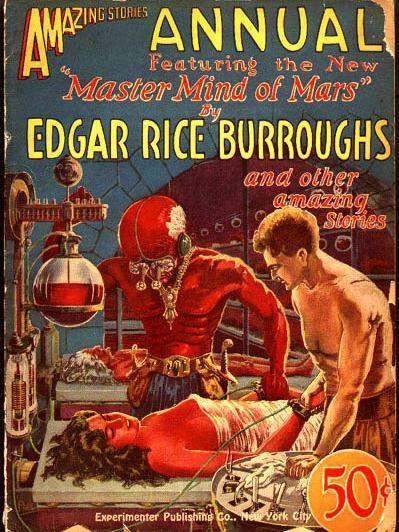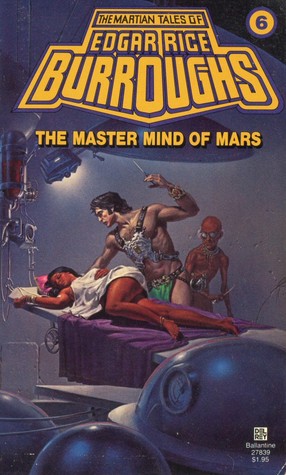 The Martian tales by Edgar Rice Burroughs can almost be considered an
anthology series by this point; in the first few books we followed the
adventures of Earthman John Carter as he explored this new world while
falling in love with the beautiful Dejah Thoris, then in the next couple
of books we got stories about Carter and Dejah Thoris’s children, but
then comes the six book and we have a completely unrelated hero arriving
on Mars. This solved a key problem that Burroughs suffered through in
the Tarzan books, “How can you have fresh romance in your story if the hero is married?”
By having other characters take center stage, while giving Dejah Thoris
a break from being kidnapped, Burroughs is able to throw in some fresh
romance.
The Martian tales by Edgar Rice Burroughs can almost be considered an
anthology series by this point; in the first few books we followed the
adventures of Earthman John Carter as he explored this new world while
falling in love with the beautiful Dejah Thoris, then in the next couple
of books we got stories about Carter and Dejah Thoris’s children, but
then comes the six book and we have a completely unrelated hero arriving
on Mars. This solved a key problem that Burroughs suffered through in
the Tarzan books, “How can you have fresh romance in your story if the hero is married?”
By having other characters take center stage, while giving Dejah Thoris
a break from being kidnapped, Burroughs is able to throw in some fresh
romance.First published in the magazine Amazing Stories Annual in July 15 of 1927 The Master Mind of Mars introduces us to Ulysses Paxton, a World War One officer who was big fan of the stories of Barsoom by Edgar Rice Burroughs, and the book begins with a letter from Paxton to Burroughs explaining how after being fatally wounded on the battlefield he found himself transported to Mars much as John Carter was. Ulysses finds himself immediately in strange situation; a large headed old man is about to be killed by a man wielding a club, and so he reacts by running the attacker through and saving the old man. We learn that the old man is Ras Thavas, one of Barroom’s greatest scientific minds, and after saving the scientist Paxton gets a job as his assistant. It’s a very weird job as Ras Thavas has perfected the techniques of transplanting brains, even between species, and he finances his other experiments by providing rich elderly Martians with youthful new bodies.
If Edgar Rice Burroughs wasn’t the first science fiction author to use the “Brain Swapping” trope he certainly perfected. The interesting thing here is that Paxton is at first not all fazed with the ethics of such a practice, maybe after witnessing the horrors of the battlefield one gets a bit jaded, but when Ras Thavas places the brain of the cruel an ancient Xaxa, Empress of the city-state of Phundahl, into the body of the beautiful Valla Dia his attitude starts to change. Valla Dia was just one of many beautiful bodies that Ras Thavas kept on ice until needed but Paxton immediately falls in love with the kind soul now trapped in the withered body of a crone. Paxton is torn because he can’t find it in himself to declare his love to Valla Dia while her brain rests in such a hideous visage, which is one of the more realistic moments to be found in space fantasy literature, and so he vows that one day he will see her brain restored to its proper body.
The Master Mind of Mars is a very tightly written adventure story; Ulysses Paxton is your standard Burroughs hero, the girl in question is of course the most beautiful woman he ever saw (well her original body that is), and Paxton will face all manner of dangers to restore her to her rightful body. He won’t be alone on his mission as he smartly enlists one of Ras Thavas past experiments, and two men who have every wish to either escape or get their own bodies back. The most fascinating of this group is Hovan Du who was part of Ras Thavas’s inter-species brain swapping experiments and now half of his brain is residing in the body of one of the great white Martian apes. Hovan Du even manages to enlist the aid of the white apes that patrol the grounds outside Ras Thavas’s abode. The other two men in the party are Dar Tarus, the warrior of Phundahl who Paxton had killed upon arriving on Mars, and Gor Hajus, a notorious assassin who has more honor in one finger than many heroes have in their whole body.
Burroughs deliciously dives into the mad science of Barsoom with both hands, but it’s not only science that Burroughs has fun with in this book. While on their mission to retrieve Valla Dia’s stolen body they visit two very different city states; one is all hard science and no heart while one is a place that forbids anything not found in their religious edicts, this includes such things a Barsoom being round and no older than a hundred years. Our heroes have fun when they discover a secret entrance into the large statue of the local god and discover mechanical eyes and listening devices as well a speaking tube for the “god” to deliver his edicts. Paxton and friends use this find to great effect to mess with the masses, as does Burroughs in this very satirical treatment of religious fundamentalists.
Edgar Rice Burroughs has never shied away from poking fun at religion but in The Master Mind of Mars it was a little to “on the nose” for some publishers and so he was forced to sell it for a third of his usual rate to a less prestigious magazine. Regardless readers certainly got their 50 cents worth when they picked up an issue of Amazing Stories containing one of these chapters, and though Ulysses Paxton is no John Carter he is still a worthy hero stand among the pantheon of Burroughs creations.



No comments:
Post a Comment